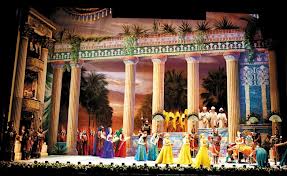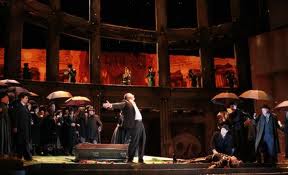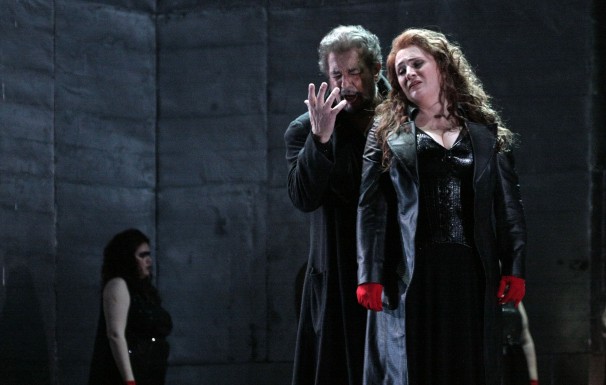|
JACQUELINE LAWTON: How long have you lived and worked as a stage manager in DC? What brought you here? Why have you stayed?
BETH KRYNICKI: I have lived and worked in the DC area for 20 years. I moved here when I was offered a job as Assistant Stage Manager for Washington Opera. I’ve stayed as long as I have because of the great friends and colleagues I have been privileged to work with at both Washington National Opera and Wolf Trap Opera Company. Without their spirit and dedication I would have moved on long ago. JL: What excites you most about being a stage manager? What do you feel your greatest challenges are? BK: I love Piano Tech rehearsals. It’s the first time the cast meets the stage and all the elements start to come together; we rarely have enough time, there are deadlines with financial implications, anxiety is usually high, and when it all works because everyone pulled together and reached the common goal and knowing I had a hand in that, it is a very satisfying feeling. JL: What traits do you feel a successful Stage Manager should have to support the health and growth of a production? BK: A Stage Manager should be patient, calm, and organized, they should think ahead, plan for the worst, and listen. JL: Does your work as a Stage Manager pay the bills? If not, what other work do you do and how do you find a balance? BK: Yes, I have always been able to support myself as a stage manager. I once took a non-theatre job for a month between gigs, but that was just to try something different. JL: Looking at your body of work as a stage manager in this community, how conscious are you of selecting plays by women or people of color when deciding your season? BK: I don’t get to choose my shows, a company’s season is decided long before they offer me a contract, which could be for just one production, so I am just happy to be employed. Having said that, given my length of service at some companies they have been kind enough to ask my preferences in which case I’ll hope to be assigned to a show that is either unfamiliar to me or fits my travel dreams. However, I’d rather be employed than not. JL: How do you feel the DC theatre community has addressed the issues of race and gender parity? How has this particular issue impacted you and your ability to work? BK: As far as I know, I have never been negatively impacted by my race or gender. If I have benefited from them I wouldn’t know either, I prefer to think that my skills and my reputation speak for themselves. Opera, in general, tends to have racially diverse casts and the pool of local performers is a wonderful melting pot; in opera the musical score determines the genders for the roles, that’s hard to bend! JL: DC audiences are … BK: …loathe to turn off cell phones. JL: DC actors, designers and directors are .. BK: …some of the friendliest and most dedicated people to work with anywhere. JL: DC critics are … BK: …not doing enough to educate the audience about the piece and its value, or lack thereof. Anybody can write a product review, but critics are supposed to be the experts. Why is a certain piece important to be produced, or is it? What did it mean to the original audience? What was its purpose in being written, does this production uphold that, go beyond it or go in another direction entirely? And remember, it’s just an opera, not actual life and death. JL: What advice do you have for an up and coming DC based stage managers? BK: Enjoy what you are doing, otherwise the hours and personalities and rules will get to you. JL: What's next for you as a stage manager? Where can we keep up with your work? BK: My next stage management project is WNO’s “Magic Flute” this spring. Check the websites for Washington National Opera or Wolf Trap Opera Company, I am involved in body or in spirit with all of their productions.
0 Comments
Your comment will be posted after it is approved.
Leave a Reply. |
My BlogI'm a playwright, dramaturg, and teaching artist. It is here where you'll find my queries and musings on life, theater and the world. My posts advocate for diversity, inclusion, and equity in the American Theatre and updates on my own work. Please enjoy!
Categories
All
Archives
June 2020
Reading List
|



